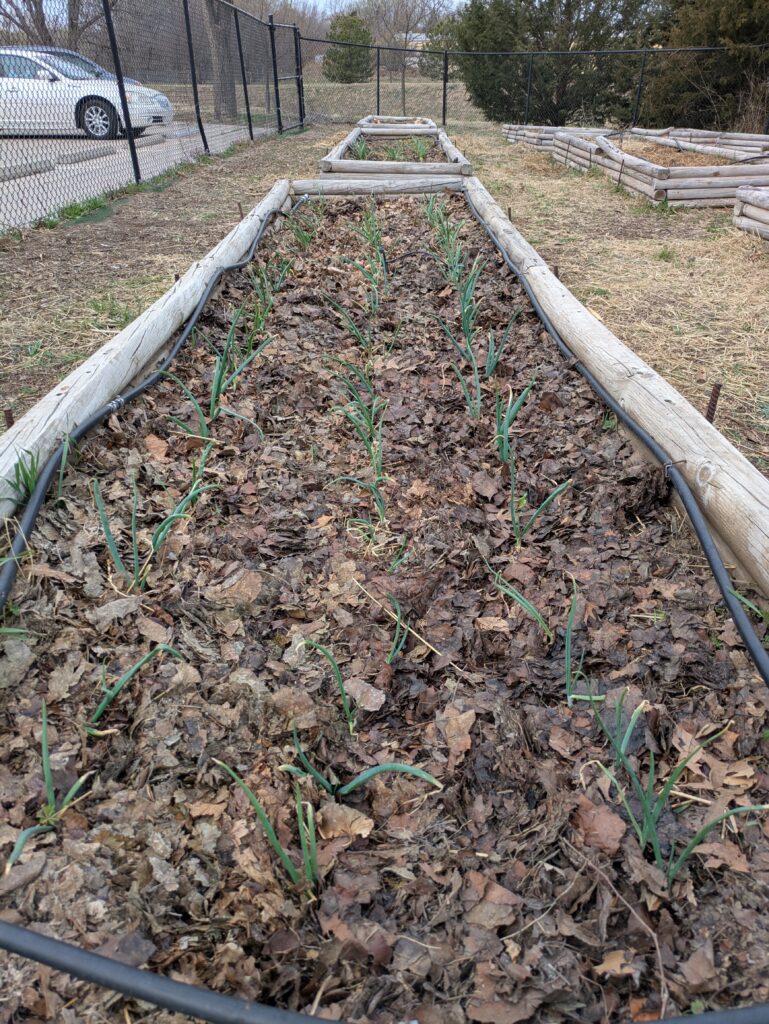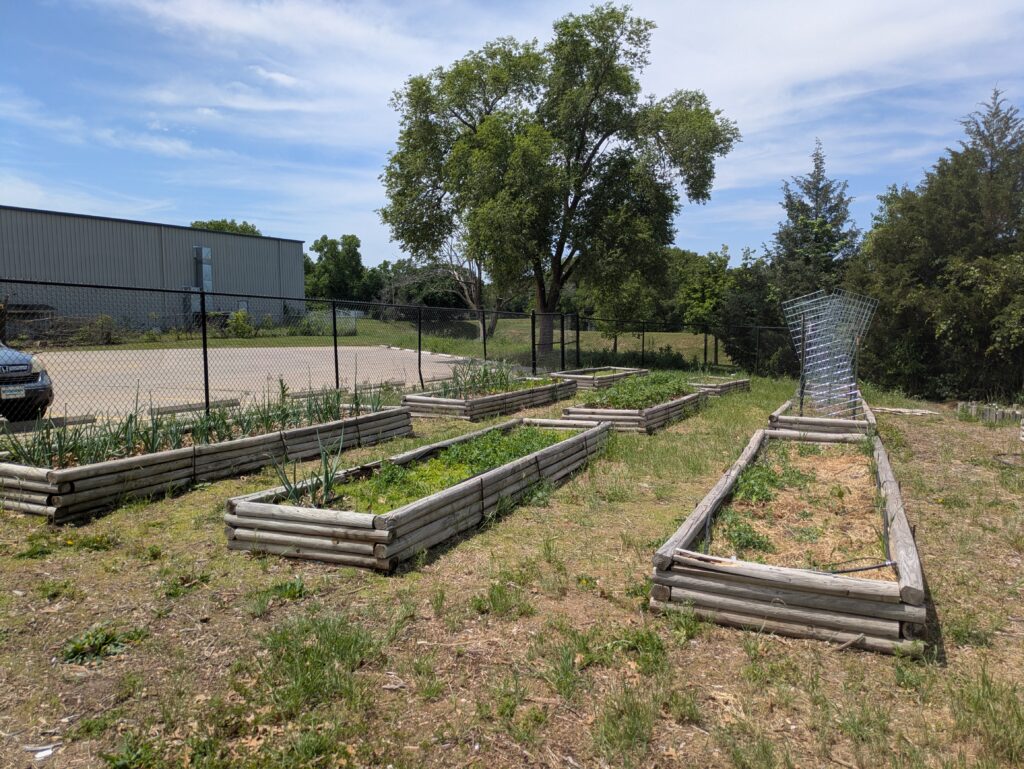Garden Plan – March 2025
It’s that time of year again. We at the Romero Catholic Worker are craving sunshine and warmth after roughly 13 inches of snow and two “winter storms” between January and February here in Wichita. Our bodies are telling us that it’s time for fresh fruit and vegetables – broccoli, salad, tomatoes, peppers, cucumbers, melons. And our brothers and sisters living in tent encampments south of town along the river have expressed a desire for fresh vegetables to add to their meals. So to that end, we’ll be working as a community to sow seeds in the garden space graciously provided by the Lord’s Diner-Hillside, beginning this month and into May.
This is our first planting season, so our goal is to get acquainted with the soil and what it might need from us in order to be healthy and fertile and to learn what our crops have to teach us about their needs, given the specifics of place, climate, and daylight. We are beginning with the knowledge that we do have, and fully expecting to learn as we go. We are students; the Lord–through His Creation–will be our Teacher. While we intend to grow food and hope for abundance so that we can share with our neighbors, our goal is stewardship, not production. If this season we learn only what the soil and crops need, then we will consider this enough. We are sowing more than seeds; we are sowing hope, love for God and neighbor, and faith in God’s provision. We are sowing because we believe that our modern, consumerist, wasteful, exploitative society is not what we were made for as humans and because we believe in the significance of small actions, working toward a “society in which it is easier for people to be good.”
Right now, leaf mulch and some locally sourced horse manure and straw compost adorn our beds, in an effort to increase the organic matter of the soil. Winter peas have begun to sprout, serving as a soil cover and as a food crop. Broccoli and cabbage seedlings will be the first to grace the beds, followed by carrots, potatoes, spinach, and lettuce later this month. We will scatter beet, radish, turnip, and kale seeds among the other plants, to bring a diversity of roots to the soil and expand the possibilities for kitchen creativity. The curcubit family–melons, cucumbers, zucchini, and squash–will be sprawled out in no time, yielding a harvest through the summer and into late fall. Tomatoes, peppers, and sweet potatoes give us reason to look forward to the heat of summer here in the Plains. And while our space is too confined to plant the Three Sisters (the indigenous planting method of the Americas for corn, beans, and squash) in the traditional way, we still plan to attempt it in a modified way, with a small crop of corn and pole beans planted together.
Each plant contributes to the soil and the garden ecosystem in a different way. This is why we have chosen a variety of vegetables, many of which we will intercrop, so that the soil and the plants are enjoying the most possible benefits from each other’s company. Diversity also protects the harvest from devastation by pests, diseases, and weather; what affects one crop may be met with resilience from another.
The harvest will be distributed among our community and neighbors, and our monthly community dinners will feature seasonal ingredients grown in our garden. Who knows? Maybe we’ll have some recipes to share in the next issue of The Radix! Fresh produce lends itself well to a sort of accountability: our dialoguing about stewardship and responsible use and localism will now have reality to test our commitment. Before the tomatoes and zucchini and greens go to waste, we’ll have to be creative about how to use them, or return them to the soil in the form of compost. So maybe there will be breakfast burrito and salsa-making parties in RCW’s future …

Post-planting Update – June 2025
The spring planting season has come to an end in the Romero Catholic Worker garden. There have been slight changes to the planting plan – we opted for another bed of carrots in place of corn, and we’re experimenting with an unconventional trellis system for our tomatoes and peppers. What has not changed is the commitment to stewarding this soil well, and the encouragement and enthusiasm that continues to grow with the lengthening of days. We have been unexpectedly blessed by the generosity and goodwill of the Wichita community. Thanks to the friendly folks at Dutch’s, a local family-owned greenhouse, we have had access to any seeds, seed potatoes, and seedlings that we need, at no cost. High school students from the Kapaun-Mt. Carmel Ecology Club volunteered their time to start and tend sweet potatoes and tomato, pepper, and melon seedlings for us. The staff at the Lord’s Diner and Our Daily Bread food pantry have unwaveringly supported us with time, advice, practical knowledge, cardboard, tools, and their enthusiasm to see the garden up and running.
We met four times this season to work together preparing the soil, sowing seeds, transplanting, mulching, weeding, and getting familiar with the garden space. Each work day began with communal prayer to consecrate ourselves and our work to God, before dispersing to our different tasks. Quiet conversation, some teasing, and the laughter of children mingled with birdsong on those (usually) chilly mornings. Many of our workers joined us for more than one work day, preparing the soil in the very beds that they planted with sweet potatoes, melons, tomatoes, and cucumbers a few months later. There was a space for every person who showed up. For the strong backs, shovels of manure and straw to haul, and beds to broadfork. For the tactically-minded, a compost bin to assemble and trellises to erect. For the dextrous of hand, delicate transplants and tender roots to situate in the soil. We have a decluttered and organized shed and thriving potato plants, thanks to high school students from Kapaun-Mt. Carmel High School who came to help out on a few Saturdays. On several of our work days, our numbers included families with children, whose wee fingers planted seeds with tenderness and pulled the tiniest weeds often overlooked by adults. We give thanks to and for each person of any age who showed up to help us tend our soil. The soil that stayed on their hands longer than they may have wished is a pact, tying them to the life out here.
Peter Maurin’s vision of authentic community included communities that shared labor and worked together toward a common goal. The Romero Catholic Worker garden is many boasts shy of a farm, and still but a glimmer of a community garden, but this season, I (Mattie) felt that I was watching Peter Maurin’s vision come to life before me–modified though it may be–as friends and families bent their knees to the ground and thrust their hands into the soil, gently protesting more than just the supermarkets and fast food of our industrial agricultural system, but also the loneliness and listlessness of our society. The many hands and hearts, the motley crew of teachers, artists, students, handymen, parents, engineers, and kids was, to me anyway, proof that a “society in which it is easier to be good” is possible, we just have to make space for it. Some may call me an idealist and a romantic, but I think it changes a person to cup their hands around a young seedling and put it in the ground, hoping and willing it–expressed or not–to survive. And anyone who has ever gardened or farmed before knows that feeling of anxious waiting and watching to see if seeds will germinate, if sprouts will begin to push their way up out of the ground, if the transplants will establish themselves. What joy we feel when they do! Not all of ours have survived, but we will plant more. Even that loss is a lesson in fragility and attentiveness, a reminder that there is so much hope in springtime and that it is a gift to touch with our hands the real cycle of death and resurrection in the soil.
